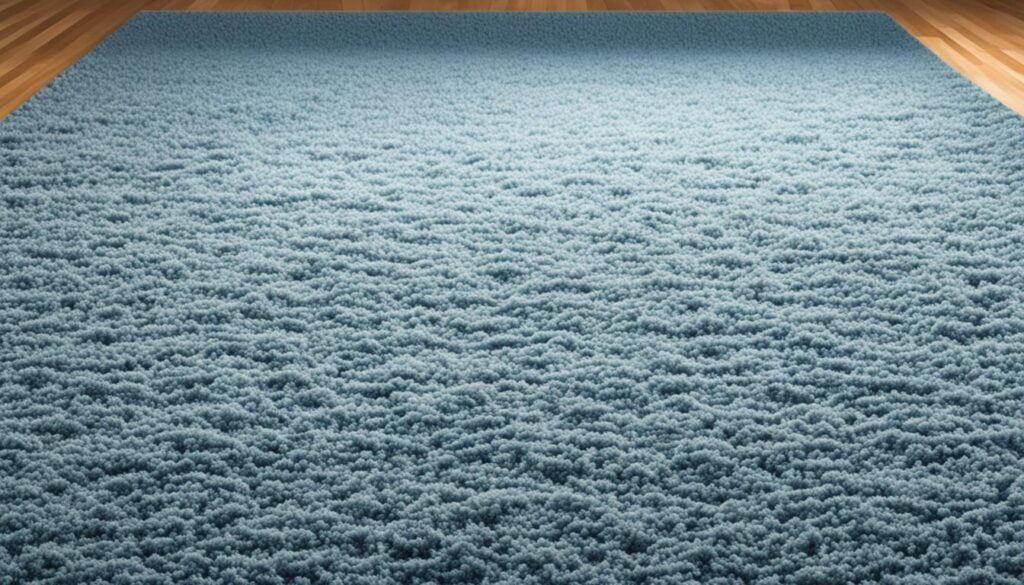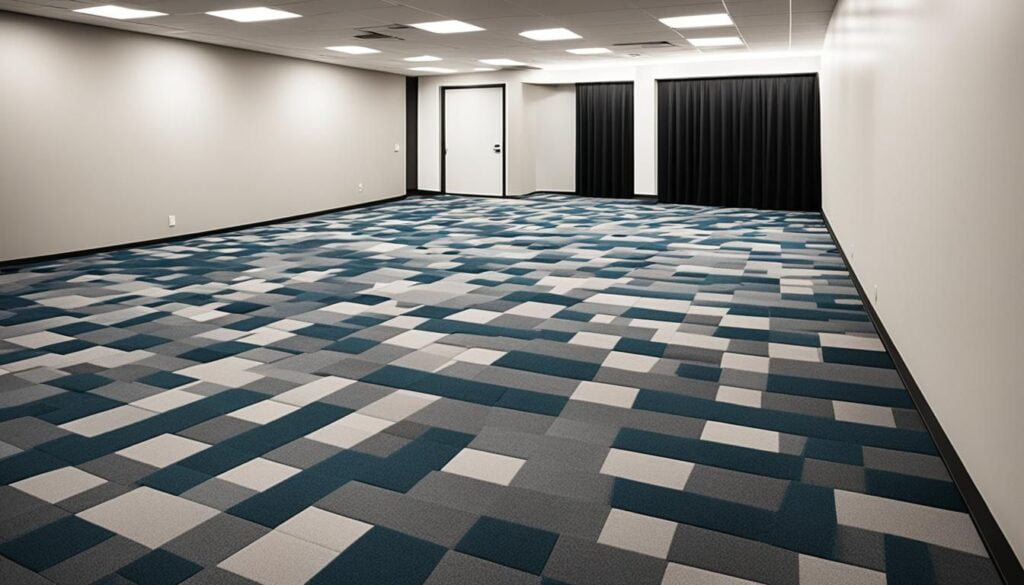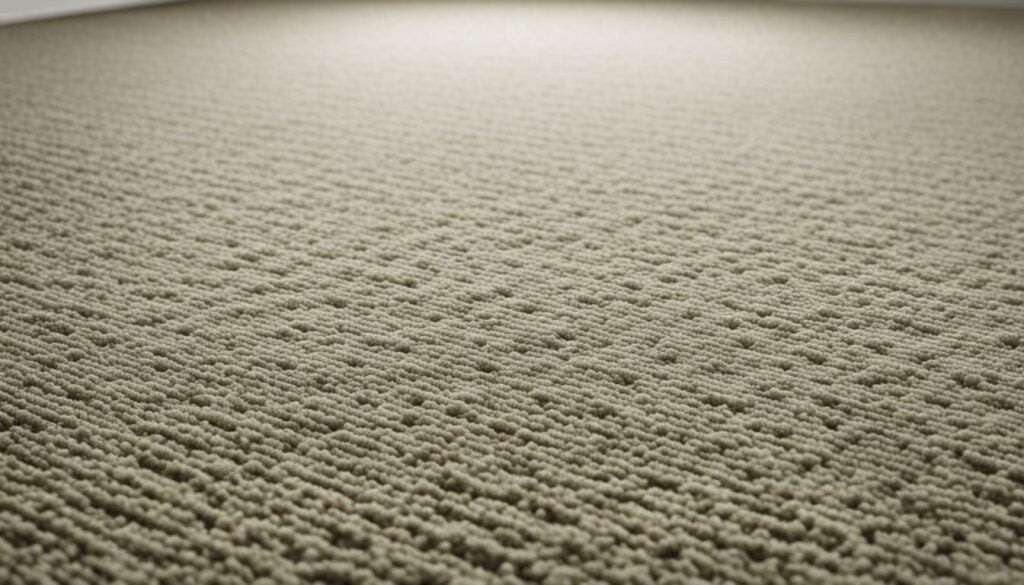
When it comes to creating a peaceful and quiet environment in your home or office, soundproofing a carpeted floor can be a game-changer.
While carpeting provides some natural noise reduction due to its soft texture, additional measures may be necessary to achieve optimal results.
Carpeting is effective at reducing impact noise, such as footsteps or furniture being moved, thanks to its cushioning properties.
According to Choice Flooring, one of the primary benefits of a soundproof carpeted floor is it will reduce foot fatigue making the carpeted space comfortable.
However, it may not be as effective in blocking airborne noise, such as music or conversations from neighboring rooms or floors.
To fully soundproof a carpeted floor, you can consider using a soundproof carpet underlay. This additional layer of material placed between the carpet and the floor helps block unwanted sounds from below or neighboring areas, offering numerous benefits beyond noise reduction.
In this guide, I have compiled some of the best ways to help soundproof a carpeted floor with the best soundproof material that will provide density to the floor and block unwanted noise.
Key Takeaways:
- Carpeting provides natural noise reduction by absorbing impact noise.
- Carpet alone may not block airborne noise effectively.
- Soundproof carpeted floor will provide density to the floor which results in blocking unwanted noise.
- Soundproofing a carpeted floor offers benefits such as blocking unwanted sound, improving insulation, and enhancing comfort.
- Using a soundproof carpet underlay can significantly enhance the soundproofing capabilities of the carpet.
- Consider using Impact Barrier QT Flooring Underlayment for superior soundproofing performance.
Does Soundproof Carpet Reduce Noise

Carpeting is a highly effective solution for reducing noise in a room. Its ability to absorb sound waves helps prevent them from bouncing off hard surfaces, such as the floor, walls, and furniture.
Pro Tip: When vibrations or sound waves reach your ears, they are perceived as noise. The carpet acts as a cushion and absorbs these vibrations, minimizing the impact noise that can occur when objects come into contact with the floor.
By absorbing sound waves, carpet helps to create a quieter and more peaceful environment.
This is especially beneficial in areas with a lot of foot traffic, as the carpet helps dampen the noise caused by footsteps.
The soundproof carpet floor is one of the effective solutions for blocking airborne noise as carpet underlayments will provide density to the floor which will act as a barrier in reducing the noise.
Additionally, carpeting can reduce the noise generated by moving furniture, making it a popular choice for rooms where there is a need for noise reduction.
However, it is important to note that carpeting alone may not be sufficient to fully block all types of noise, particularly airborne noise that travels from room to room.
The carpet’s effectiveness in reducing impact noise may not extend to noise that originates from sources outside the room.
While carpet provides significant noise reduction benefits, additional soundproofing measures may be necessary to achieve optimal results, especially for reducing airborne noise.
Combining carpets with other soundproofing materials, such as acoustic underlays or padding, can enhance its noise reduction capabilities and provide a more comprehensive solution for reducing both impact and airborne noise.
Reasons For Soundproofing A Carpeted Floor

Soundproofing a carpeted room is essential to address the issue of airborne noise that can penetrate through the carpet and disrupt the acoustics of the space.
While carpeting offers some level of noise reduction, it may not provide adequate soundproofing for sounds originating from below or neighboring areas.
This means that noise from restaurants, bars, or other businesses situated beneath or near a carpeted room can still be audible, highlighting the need for additional soundproofing measures.
To effectively soundproof a carpeted room, it is crucial to address both impact noise and airborne noise.
Impact noise consists of sounds created by footsteps, moving furniture, or other physical impacts that can be transmitted through the floor.
Carpeting reduces impact noise to some extent due to its soft texture, which absorbs sound waves.
However, airborne noise, which includes sounds like voices, music, or television, can easily travel through the carpet and impact the overall acoustic experience of the room.
To overcome this, soundproofing techniques should focus on minimizing the transmission of airborne noise through the carpet and floor.
By soundproofing a carpeted room, you can create a quieter and more peaceful environment, free from the disturbance of external sounds.
Soundproof carpet will provide density to the floor and will reduce airborne noise it will strengthen the barrier against unwanted noise that is passing through the floor and footstep noise will be reduced there will much cushioning.
Additionally, soundproofing provides insulation benefits, keeping the room warmer in winter and cooler in summer, while reducing energy consumption and costs.
Benefits Of Soundproofing Carpet Floors

Soundproofing a carpeted floor offers several advantages. It helps block unwanted noise, especially airborne noise, providing a quieter and more peaceful environment.
Additionally, soundproofing can help enhance the durability of the carpet and improve its overall appearance. It also adds insulation to the room, making it more energy-efficient and reducing heating and cooling costs.
Soundproofing a carpet can enhance the comfort of the space by providing a thicker and more resilient surface underfoot.
To achieve optimal soundproofing for a carpeted floor, incorporating carpet padding specifically designed for soundproofing is essential.
The use of high-quality carpet padding for soundproofing effectively minimizes the transmission of noise and vibrations, leading to a significantly quieter environment.
One of the main benefits of soundproofing carpet floors is the reduction of airborne noise. Airborne noise refers to sounds that travel through the air and can easily penetrate traditional carpeting.
By soundproofing the carpet, the transmission of these sounds can be minimized, creating a more serene living or working space.
Key Benefits of Soundproofing Carpet Floors:
- Blocks unwanted noise, especially airborne noise
- Creates a quieter and more peaceful environment
- Enhances the durability and appearance of the carpet
- Improves energy efficiency and reduces heating/cooling costs
- Provides a thicker and more resilient surface underfoot
Soundproofing a carpet can transform a noisy space into an oasis of tranquility. Whether it’s a residential or commercial setting, utilizing carpet sound insulation techniques brings numerous benefits.
By reducing unwanted noise, enhancing the carpet’s longevity, improving thermal insulation, and enhancing overall comfort, soundproofing carpet floors ensures a more enjoyable and peaceful environment.
How To Soundproof Carpet Flooring

To maximize the soundproofing capabilities of carpet, experts recommend using a carpet underlay or padding.
This additional layer of material is placed between the carpet and the floor and helps block airborne sounds. Underlays made of soundproof materials can significantly enhance the soundproofing performance of carpets.
1. Acoustic Carpet Tiles
Acoustic carpet tiles are another option for soundproofing a carpeted floor. These specially designed tiles are made with soundproofing properties and can be installed directly over the existing carpet.
By using acoustic carpet tiles, you can easily create a soundproof barrier without removing or replacing the entire carpet. These tiles are available in various sizes and styles, allowing you to choose the best fit for your space.
Another advantage of acoustic carpet tiles is their versatility. They can be easily removed and reinstalled, making them an ideal choice for temporary or rented spaces.
Additionally, acoustic carpet tiles offer added benefits such as thermal insulation, improved indoor air quality, and enhanced comfort underfoot.
2. Soundproof Carpet Underlayments
Another best way of soundproofing a carpeted floor is to carpet underlayments they will provide an extra layer of soundproofing to the existing one.
This will go under the carpet and the floor with an extra layer of material that is known as successfully blocking airborne. Soundproof underlayment will take your carpet soundproofing to another level beyond the natural soundproofing of carpet alone.
To further enhance the soundproofing performance of carpet flooring, consider using products like impact barrier flooring underlayment. These underlayments are specifically designed to provide higher levels of sound protection in carpeted spaces.
Procedure To Soundproof A Carpeted Floor
- Get your tools like a utility knife, a stair tool, and a carpet stretcher
- Since you’ll be spending a lot of time on your knees it’s better to get an anti-slip knee pad. Protect your knees with a blanket or towel
- If your carpet is struck between the baseboard trims and floor transition then remove that with the help of a prybar and hammer if it’s in the edges you’ll have to pry those pieces carefully.
- Remove the carpet padding as most of the carpets have padding below the surface level to install the new one remove the existing padding.
- Lay down some MLV if you’re worried about airborne noise as it will thicken up your floor.
- Lay down the carpet underlayment depending on the type of carpet underlayment, you’ll have to nail it staple it, or glue it down to the subfloor.
- After everything is done then you need to stretch the carpet and reattach the carpeting to the tack strip. A knee stretcher may be all you need to reattach the carpet.
Pro tip: If you don’t want to remove the carpeting there are ways to soundproof your floor without taking that hassle. You can use more carpets and rugs to place on top of the carpeted area this will provide an additional layer of dampening resulting in reducing the noise
Final Thoughts On Soundproof Carpeted Floor
Soundproofing a carpeted floor is essential for creating a peaceful and comfortable environment in any room. While carpeting provides some level of noise reduction, additional measures are often needed to achieve optimal soundproofing results, especially when it comes to blocking airborne noise.
Soundproof carpeted floor will give you comfort and make the floor soundproof as there will be an additional layer of soundproof material like soundproof underlayments which will block airborne noise.
I have also explained about acoustic carpet tiles and how they work in blocking airborne noise with an additional layer without removing the carpet you can place the acoustic carpet tile. If you don’t want to go with carpet underlayments then acoustic carpet tile will work well in blocking unwanted noise.
By incorporating soundproofing techniques you can enjoy a quieter space with improved and enhanced insulation. Soundproofing a carpeted floor helps minimize the impact of footsteps and furniture moving in the space.
It will also prevent airborne noise such as music or conversations from neighbors’ rooms and disturbing the peace of your space. Soundproof carpeted floor will dampen the floor make it more resistant to noise and provide an additional layer of cushioning for blocking out unwanted noise.
Related Articles:
How To Seal Sides Of Garage Door
FAQ
How does carpet reduce noise?
Carpet reduces noise by absorbing soundwaves and preventing them from bouncing off hard surfaces. It acts as a cushion and absorbs vibrations, minimizing impact noise. However, it may not block airborne noise as effectively.
Why should I soundproof a carpet?
Soundproofing a carpet can help address airborne noise that can penetrate through the carpet. It provides a quieter and more peaceful environment and can block unwanted noise from neighboring areas or rooms.
What are the benefits of soundproofing carpet floors?
Soundproofing carpet floors offers several benefits, including blocking unwanted noise, improving insulation, prolonging the lifespan of the carpet, and providing a more comfortable surface.
